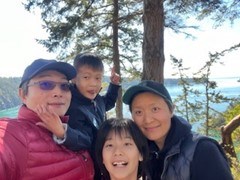Susan, a Senior Trade Mark Agent, is a member of our Shanghai Office trade marks team. She has extensive trade mark experience in China having worked with both government authorities and in private practice. She currently provides a wide range of trade mark and portfolio management services to a variety of clients, including a number of leading brand owners.
Like debates about many other topics at the moment, the on-going office v. remote working debate is apparently becoming increasingly heated and divisive. The effectiveness and efficiency of remote working obviously varies according to the situation, the type of work, and the people involved. There will probably never be any hard and fast rules, but everyone would probably agree that effective communication and a high degree of mutual trust are crucial.
Susan had been working with Rouse in Shanghai for 17 years and was an integral part of the trade marks team when her husband, at the time an in-house counsel with Starbucks in Shanghai, was offered a position at the company’s head office in Seattle. It was a wonderful opportunity and, after much discussion, the family decided to move to America. For Susan this meant working remotely. In her case, there were already firmly established lines of communication in place and a high level of trust on both sides. But there are also other reasons why she has been able to continue working so successfully with the Shanghai team.
Many of her clients are located in the United States, which means she is now able to communicate with them directly during the normal working day. That is a real advantage. And because Seattle is nine hours ahead of Shanghai, she is able to talk with her colleagues after dinner when she is relaxed and her children have gone to bed. It works well. She has the flexibility to be able to collect her children from school in the afternoon and spend some time with them before returning to the computer in the evenings for calls and conferences. Moving from China to America has meant huge change for the whole family, but the increased flexibility of her working life has no doubt made the move a lot easier than it would otherwise have been. In addition, Susan’s personality, character, and sense of responsibility, as well as her flexibility, are important factors in her successful remote working experience.
Both Susan and her husband, grew up in Shanghai as only children. Susan’s mother taught Chinese in elementary school and her father was a government official. Neither had had easy lives – when they were young they had both been sent to the country during the Cultural Revolution and did not have the opportunity to study. Not surprisingly, their expectations for their only daughter were very high. At the time, it was not uncommon for children in China to be placed under considerable pressure: parents would decide which courses their children should take and which universities they should attend; children were expected to study hard and follow instructions. Susan’s parents were not at all unusual in wanting her to be either a lawyer or a doctor.
They were, however, somewhat unusual in deciding to send her to board at the prestigious Shanghai No. 3 Girls’ School when she was 12 or 13. They knew the school’s reputation and thought, rightly, that boarding would develop Susan’s independence. The school, or its predecessor, was originally established in 1892 by American Methodist missionaries for the education of young women - a radical notion at the time. It has remained at the forefront of education in China ever since and is now often described as a ‘cradle of talented women’. Susan did well at school academically, but by the time she was about to leave, her thoughts were not on either law or medicine. Instead, she was keen to be a clothes designer and applied to go to a design school. Her parents, however, did not consider that designing clothes could be a stable job and they did not support her. So she decided to do Law and enrolled at the East China University of Political Science and Law, one of China’s leading universities for legal education.
At the time, Intellectual Property was a new subject, and, possibly because of her interest in design, she was intrigued and decided to enrol. She wasn’t disappointed and when she graduated she obtained a position as an official in the Administration for Industry and Commerce (AIC) where she remained for five years, gaining valuable commercial and business experience. At that point, she was looking to broaden her experience and Linda Chang, who was then at Rouse in Shanghai, but had previously worked at the AIC, asked if she might be interested to work at Rouse. She was. She joined the trade marks team and subsequently qualified as a Trade Mark Attorney. 
Now, 18 years later, Susan and her family are settling in to their new life in Seattle. Initially, it was obviously difficult for their parents to accept that they would be so far away, but that changed when they saw that their children were doing well professionally and that both they and their grandchildren were happy. Being able to chat regularly on WeChat helped too. Susan’s 10 year old daughter and six year old son have adapted very quickly to their new life and are absolutely loving their new school. There is much less pressure than they had at their school in Shanghai, much less homework, and much more sport and freedom generally.
So, while the debate about remote working is not likely to stop any time soon, it is clear that in situations like Susan’s, it works extremely well.